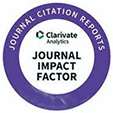Biodegradation of Extractable Petroleum Hydrocarbons by Consortia Bacillus cereus and Pseudomonas putida in Petroleum Contaminated-Soil
Abubakar Tuhuloula(1*), Suprapto Suprapto(2), Ali Altway(3), Sri Rachmania Juliastuti(4)
(1) Department of Chemical Engineering, Institut Teknologi Sepuluh Nopember, Surabaya 60111, Indonesia
(2) Department of Chemical Engineering, Institut Teknologi Sepuluh Nopember, Surabaya 60111, Indonesia
(3) Department of Chemical Engineering, Institut Teknologi Sepuluh Nopember, Surabaya 60111, Indonesia
(4) Department of Chemical Engineering, Institut Teknologi Sepuluh Nopember, Surabaya 60111, Indonesia
(*) Corresponding Author
Abstract
Keywords
Full Text:
Full Text PDFReferences
[1] Van Hamme, J.D., Sing, A., and Ward, O.P., 2003, Recent advances in petroleum microbiology, Microbiol. Mol. Biol. Rev., 67 (4), 503–549.
[2] Lifrieri, J., 2014, Explanation of the EPH Test for Petroleum Wastes, Warren Pro.
[3] Mrozik, A., Piotrowska-Seget, Z., and Labuzek, S., 2003, Bacterial degradation and bioremediation of polycyclic aromatic hydrocarbon, Pol. J. Environ. Stud., 12(1), 15–25.
[4] Rahman, K.S.M., Thahira-Rahman, J., Lakshmana perumalsamy, P., and Banat, I.M., 2002, Towards efficient crude oil degradation by a mixed bacterial consortium, Bioresour. Technol., 85 (3), 257–261.
[5] Li., X., Li., P., Lin., X., Zhang, C., Li., Q., and Gong, Z., 2008, Biodegradation of aged polycyclic aromatic hydrocarbons (PAHs) by microbial consortia in soil and slurry phases, J. Hazard. Mater., 150 (1), 21–26.
[6] Prabhakaran, P., Sureshbabu, A., Rajakumar, S., and Ayyasamy, P.M., 2014, Bioremediation of crude oil in synthetic mineral salts medium enriched with aerobic bacterial consortium, Int. J. Innov. Res. Sci. Eng. Technol., 3 (2), 9236–9242.
[7] Keputusan Menteri Lingkungan Hidup No. 128 Tahun 2003, Tata Cara Persyaratan Teknis Pengolahan Limbah Minyak Bumi dan Tanah Terkontaminasi oleh Minyak Bumi secara Biologis.
[8] Desrina, R., 2011, Perbandingan biaya pada teknik-teknik remediasi tanah tercemar minyak bumi, Lembaran Publikasi Minyak dan Gas Bumi, 45 (3), 183–194.
[9] Leahy, J.G., and Colwell, R.R., 1990, Microbial degradation of hydrocarbons in the environment, Microbiol. Rev., 54 (3), 305–315.
[10] Mandri, T., and Lin, J., 2007, Isolation and characterization of engine oil degrading indigenous microrganisms in Kwazulu-Natal, South Africa, Afr. J. Biotechnol., 6 (1), 23–27.
[11] Etkin, D.S., 1998, Oil Spills from Production and Exploration Activities, Oil Spill Intelligence Report, White Paper Series Vol. II, No. 8, Cutter Information Corp.
[12] Juwarkar, A.A., 2013, Microbe-assisted Phytoremediation for Restoration of Biodiversity of Degraded Land: A Sustainable Solution, Proc. Natl. Acad. Sci. India Sect. B Biol. Sci., 82, 313–318.
[13] Prakash, A., Bisht, S., Singh, J., Teotia, P., Kela, R., and Kumar, V., 2014, Biodegradation potential of petroleum hydrocarbons by bacteria and mixed bacterial consortium isolated from contaminated sites, Turk. J. Eng. Environ. Sci., 38 (1), 41–50.
[14] Machin-Ramírez, C., Okoh, A.I., Morales, D., Mayolo-Deloisa, K., Quintero, R., and Trejo-Hernández, M.R., 2008, Slurry-phase biodegradation of weathered oily sludge waste, Chemosphere, 70 (4), 737–744.
[15] Milic, J.S., Beškoski, V.P., Ilić, M.V., Ali, S.A.M., Gojgić-Cvijović, G.D., and Vrvić, M.M., 2009, Bioremediation of soil heavily contaminated with crude oil and its products: Composition of the microbial consortium, J. Serb. Chem. Soc., 74 (4), 455–460.
[16] Ghazali, F.M., Rahman, R.N.Z.A., Salleh, A.B., and Basri, M., 2004, Biodegradation of hydrocarbons in soil by microbial consortium, Int. Biodeterior. Biodegrad., 54 (1), 61–67.
[17] Das, K., and Mukherjee, A.K., 2007, Crude petroleum-oil biodegradation efficiency of Bacillus subtilis and Pseudomonas aeruginosa strains isolated from a petroleum-oil contaminated soil from North-East India, Bioresour. Technol., 98 (7), 1339–1345.
[18] Bujang, M., Ibrahim, N.A., and Eh Rak, A., 2013, Biodegradation of oily wastewater by pure culture of Bacillus cereus, ARPN J. Agric. Biol. Sci., 8 (2), 108–115.
[19] Schwarzbauer, J., Littke, R.V., and Weigelt, V., 2000, Identification of specific organic contaminants for estimating the contribution of the Elbe river to the pollution of the German bight, Org. Geochem., 31 (12), 1713–1731.
[20] Wolfgang, F., and Martin, H., 2000, “Aerobic Degradation by Microorganisms” in Environmental Processes-Soil Decontamination, Klein, J., Ed., Wiley-VCH, Weinheim, Germany, 146–155.
[21] Das, N., and Chandran, P., 2011, Microbial degradation of petroleum hydrocarbon contaminants: An overview, Biotechnol. Res. Int., 2011, 941810.
[22] Kayser, F.H., Bienz, K.A., Eckert, J., and Zinkernagel, R.M., 2005, Medical Microbiology, Thieme Stuttgart, New York.
[23] Jawetz, Melnick, Adelberg’s., 2016, Medical Microbiology, 27th ed., McGraw-Hill Book Company.
[24] Menzie, C.A., Potocki, B.B., and Santodonato, J., 1992, Exposure to carcinogenic PAHs in the environment, Environ. Sci. Technol., 26, 1278–1284.
[25] Atlas, R.M., 1981, Microbial degradation of petroleum hydrocarbons: An environmental perspective, Microbiol. Rev., 45 (1), 180–209.
[26] Greenwood, P.F., Wibrow, S., George, S.J., and Tibbett, M., 2008, Sequential hydrocarbon biodegradation in a soil from arid coastal Australia, treated with oil under laboratory controlled conditions, Org. Geochem., 39 (9), 1336–1346.
[27] Peng, S., Zhou, Q., Cai, Z., and Zhang, Z., 2009, Phytoremediation of petroleum contaminated soils by Mirabilis jalapa L. in a greenhouse plot experiment, J. Hazard. Mater., 168 (2-3), 1490–1496.
[28] Potin, O., Veignie, E., and Rafin, C., 2004, Biodegradation of polycyclic aromatic hydrocarbons (PAHs) by Cladosporium sphaerospermum isolated from an aged PAH contaminated soil, FEMS Microbiol. Ecol., 51 (1), 71–78.
Article Metrics
Copyright (c) 2019 Indonesian Journal of Chemistry

This work is licensed under a Creative Commons Attribution-NonCommercial-NoDerivatives 4.0 International License.
Indonesian Journal of Chemistry (ISSN 1411-9420 /e-ISSN 2460-1578) - Chemistry Department, Universitas Gadjah Mada, Indonesia.












